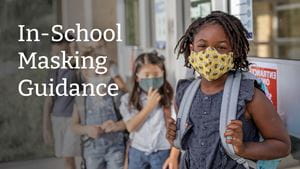
On July 18, the American Academy of Pediatrics (AAP) released new guidance urging schools to enforce a masking policy while learning in person. The Centers for Disease Control (CDC) soon followed suit, releasing an update in support of the AAP’s guidance on July 27.
This comes a month before many American schools plan to re-open, bringing students back into the classroom after a year of fully remote or hybrid schooling.
The AAP encourages schools to prioritize attending school in person while actively aiming to protect staff and students from COVID-19. A masking policy is one way that schools can work to avoid COVID-19 outbreaks and reduce the likelihood of moving back to a remote setting.
Dr. Steven Schulz, a pediatrician at Rochester Regional Health, explains the guidance and why masks are still important.
“The most effective way to prevent the spread of COVID-19 is to get vaccinated. However, because children under the age of twelve are not yet eligible for the vaccine, the majority of kids in school are not vaccinated,” explained pediatrician Dr. Steven Schulz.
“Even so, many eligible students and staff are not yet vaccinated, making masks a necessary safeguard to protect people in schools and keep students in person.”
The AAP recommends a conservative approach to masking in order to prioritize children’s safety in conjunction with in-person learning.
With the recent Delta variant, COVID-19 is much more infectious and continues to spread widely, especially among those unvaccinated.
“Across the United States, 97.5 percent of folks in the hospital due to COVID-19 are unvaccinated,” Dr. Schulz said.
Largely due to a lack of eligibility for the vaccine, children are not safe from the spread of COVID-19. Dr. Schulz pointed out that the proportion of COVID-19 cases in pediatric patients has greatly increased since the start of spring because adults have been eligible to get vaccinated.
“Masking in schools will help protect those who are unvaccinated, but also adds that additional layer of protection for those who did get the vaccine given the increased infectivity of the Delta variant, which is now predominant in our region.”
Throughout the last year, children faced a variety of challenges while adapting to remote or hybrid learning.
“In our pediatric patients, we saw mental health issues, emotional and social troubles, and even a negative impact on physical health, such as weight gain, for many. We noticed a lot of hardships among those children who lost in-person schooling and the social interaction that comes with that,” Dr. Schulz said.
While school is important for educational learning, it also helps children develop socially, behaviorally, and mentally. Staying safe and wearing masks in school can help children stay in person and avoid missing out on any more social interactions.
“Even for those who were home-schooled before COVID-19, slowing the spread of the pandemic will help ensure that children don’t miss out on any activities they may have been involved in, such as sports, clubs, and camps,” Dr. Schulz said.
On June 7, New York State released masking guidance for schools, stating that schools must ensure appropriate face coverings are worn by all individuals at all times while indoors, aside from mealtime. The guidance allows for masks to be taken off outside—but schools may choose to require masks on outdoor school premises.
The state-wide guidance encourages schools to prioritize in-person learning as well as the safety and protection of all students and staff.
The more people that get the vaccine, the closer we will be to returning to normal and not requiring masks.
“We highly recommend that every eligible individual receives the COVID-19 vaccine to help reduce the spread and protect themselves against severe cases of COVID-19,” said Dr. Schulz.
In May, SUNY Chancellor Jim Malatras announced that every SUNY school will require students to be vaccinated on campus. If a student has a medical, religious, or other reason that exempts them from receiving the vaccine, they will be required to wear masks and undergo weekly COVID-19 testing.
Private colleges and universities will develop their own protocols in the coming weeks. Be sure to stay up-to-date with your or your child’s school guidelines to have a full understanding of expectations.